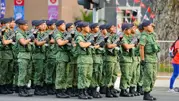Types of leave in Singapore that HR should know
In the fast-paced work environment of Singapore, understanding the various types of leave in Singapore is essential for HR professionals. The Ministry of Manpower (MOM) regulates leave policies to ensure fair treatment. While not all leaves are legally required, having clear leave policies is vital for attracting and retaining talent and fostering a positive work environment.

There are many types of leave in Singapore
Importance of employee leaves
Exploring the different types of leave in Singapore reveals the comprehensive support system for workers. Employee leaves are a fundamental component of workplace management, offering numerous benefits for both employees and employers. Here's why employee leave is essential:
-
Regulatory requirements: Singapore's Ministry of Manpower (MOM) mandates specific leave entitlements and regulations to ensure fair treatment of employees.
-
Adherence to employment laws: Employers must comply with the Employment Act and other relevant legislation to avoid legal penalties and fines.
-
Physical health: Allows employees to take time off to recover from illnesses or medical conditions, promoting overall well-being and reducing the spread of illness in the workplace.
-
Mental health: Provides opportunities for rest and relaxation, reducing stress and preventing burnout, which can enhance mental health and productivity.
-
Work-Life balance: Gives employees the flexibility to attend to personal and family matters, such as caring for children or attending medical appointments, leading to a better work-life balance. Employees who feel supported in achieving work-life balance are likely to be more satisfied and engaged in their roles.
-
Increased focus: Rested and refreshed employees are more focused and productive at work, leading to higher performance levels and better outcomes.
-
Reduced absenteeism: Adequate leave policies can help reduce unscheduled absences and absenteeism, ensuring continuity of business operations.
-
Job satisfaction: Fair and transparent leave policies contribute to higher levels of job satisfaction among employees, fostering loyalty and commitment to the organization.
-
Brand image: Demonstrating a commitment to employee welfare enhances the company's corporate image and reputation in the marketplace. Companies known for valuing and supporting employee well-being through comprehensive leave policies are perceived as desirable employers, attracting top talent.
>>>See more: What is the retirement age in Singapore?

Leave policies in Singapore boost employee satisfaction, loyalty and work-life balance
Annual Leave
Navigating the regulations surrounding types of leave in Singapore requires a clear understanding of labor laws. Annual leave in Singapore is a significant entitlement regulated by the Employment Act. According to this law, employees covered by the Employment Act and who have worked for at least 3 months are entitled to annual leave. The number of annual leave days is determined based on the employee's length of service with the employer. This entitlement increases progressively with each year of service, starting from 7 days in the first year and reaching up to 14 days from the eighth year onwards.
For employees with less than a year of service or those who have taken unpaid leave, the entitlement is calculated based on the completed months of service. This ensures that employees receive their annual leave entitlement fairly and accurately. Additionally, annual leave provides employees with the opportunity to rest, maintain their health and achieve work-life balance.

Annual Leave is a vital benefit ensuring employee rest and work-life balance
Replacement Leave/Off-in-Lieu
Replacement Leave/Public Holidays and Off-in-Lieu in Singapore are provisions within the Employment Act that ensure fair compensation and rest time for employees working on public holidays. Employees covered by the Employment Act are entitled to 11 paid public holidays per year. These are:
-
New Year’s Day
-
Chinese New Year (2 days)
-
Hari Raya Puasa
-
Hari Raya Haji
-
Good Friday
-
Labour Day
-
Vesak Day
-
National Day
-
Deepavali
-
Christmas
If a public holiday falls on a rest day or non-working day, employees are entitled to a replacement day off or extra pay. Public holiday pay is typically calculated based on the employee's basic salary rate. Overtime pay may apply if employees work beyond their regular hours. Employees and employers can agree to substitute a public holiday with another working day. For employees not covered by Part IV of the Employment Act, off-in-lieu time can be granted, including a pre-agreed number of hours.

Replacement Leave is provided to compensate for work done on public holidays
Sick Leave
In Singapore, employees are entitled to both paid outpatient sick leave and paid hospitalisation leave if they have worked for at least 3 months with their employer and are covered under the Employment Act. However, employers are not required to cover cosmetic procedures unless specified by company policy.
To be eligible, employees must inform their employer within 48 hours of their absence and be certified unfit for work by a registered medical practitioner.
-
Employees can receive up to 14 days of outpatient sick leave and 60 days of hospitalisation leave per year, with the latter including the former.
-
New employees under 6 months receive pro-rated leave based on their service length.
These regulations ensure employees have adequate rest and medical care, promoting overall health and well-being in the workforce.

Sick Leave is one of the mandated types of leave in Singapore
Hospitalization Leave
In Singapore, employees who have worked for at least 3 months with their employer are entitled to paid hospitalisation leave under the Employment Act. To qualify, they must inform their employer within 48 hours of your absence and be certified by a registered medical practitioner. Hospitalisation leave covers periods when hospital care, day surgery, bed rest, recovery post-discharge, or legal quarantine is needed.
-
Employees can receive up to 60 days per year, including 14 days of outpatient sick leave.
-
New hires under 6 months receive pro-rated leave based on their service length.
Notifying the employer promptly and providing a medical certificate upon return are required. These provisions ensure employees get the necessary rest and medical care, promoting workforce well-being.

Hospitalization Leave provides extended support for severe medical conditions
Maternity Leave
In Singapore, working mothers are entitled to maternity leave based on specific criteria. If their child is a Singapore citizen, they are legally married to the child's father, their child is born or expected to be born on or after January 1, 2017 and they have worked for employer or been self-employed for at least 3 continuous months before the birth, they qualify for Government-Paid Maternity Leave (GPML).
Eligible mothers receive 16 weeks of paid maternity leave for the first and second births:
-
The employer pays the first 8 weeks
-
The government reimburses the last 8 weeks (capped at $10,000 per 4 weeks, up to $20,000)
For the third and subsequent births: The government covers all 16 weeks (capped at $10,000 per 4 weeks, up to $40,000).
The working mothers must give HR at least 1 week's notice before starting maternity leave and inform them as soon as possible after delivery. They can also share up to 4 weeks of maternity leave with your husband under the shared parental leave scheme.

Maternity Leave in Singapore offers 16 weeks of paid leave for eligible working mothers
Paternity Leave
In Singapore, eligible working fathers, including the self-employed, are entitled to 2 weeks of Government-Paid Paternity Leave (GPPL) for children born from January 1, 2017. To qualify, fathers must meet the following criteria:
-
The child must be a Singapore citizen
-
The father must be legally married to the child's mother between conception and birth
-
The father must have worked continuously for at least 3 months before the child's birth
Adoptive fathers with similar conditions are also eligible. Each week of GPPL is capped at $2,500, including CPF contributions. From January 1, 2024, GPPL entitlement will increase to 4 weeks, with the additional 2 weeks being granted voluntarily by employers and reimbursed by the government. Fathers can take the leave continuously within 16 weeks of the child's birth or flexibly within 12 months, including splitting the leave into individual working days.

Paternity Leave in Singapore provides 2 weeks of paid leave for eligible fathers
Adoption Leave
In Singapore, eligible adoptive mothers, including the self-employed, are entitled to 12 weeks of paid adoption leave to bond with and care for their adopted infants. To qualify, mothers must meet specific criteria:
-
The adopted child must be below 12 months old at the formal intent to adopt, be a Singapore citizen.
-
The mother must have served her employer or been self-employed continuously for at least 3 months before the formal intent to adopt.
-
If the formal intent to adopt is on or after July 1, 2017, mothers are entitled to 12 weeks of adoption leave, while those before that date are entitled to 4 weeks.
The leave is capped at $10,000 per every 4-week period, including CPF contributions. Mothers can start their leave from the formal intent to adopt and must consume it before the child's first birthday. The employer pays the usual salary during the leave, with reimbursement from the government. The leave can be taken continuously or flexibly, with the first 8 weeks as a continuous stretch and the last 4 weeks taken flexibly before the child's first birthday.

Adoption Leave entitles eligible parents to 12 weeks of paid leave to bond with and care for their adopted infants
Childcare Leave
In Singapore, eligible working parents can access childcare leave, with 6 days per year for those with Singapore citizen children under 7. For non-citizen children, parents can avail 2 days annually. To qualify:
-
The child must be under 7
-
The child is a Singapore citizen
-
The parent must have worked continuously for 3 months
Each parent gets 6 days, up to 42 days. Leave must be taken by year-end, paid partially by the employer and government, capped at $500 per day. Leave can start in the child's birth year or the following year.

Childcare Leave allows eligible parents in Singapore to take up to 6 days of paid leave
National Service Leave
In Singapore, all citizens and permanent residents are required to serve full-time national service for 2 to 2.5 years. During this period, employees will receive compensation equivalent to their regular pay and any government-subsidized pay must be returned to Adobe. Notify manager/HR upon receiving notification from the relevant authority (SAF 100) and submit leave request via Workday. Keep in mind that during their Leave of Absence, benefits, time off accruals and compensation may be affected.

National Service Leave is time off for military duty
Compassionate Leave
Bereavement leave, also known as compassionate leave, provides employees with time off to grieve and attend to funeral arrangements after the loss of an immediate family member. In Singapore, there is no legal requirement for employers to provide bereavement leave, but many companies offer it as a discretionary benefit.
Typical practices include offering 3-5 days of paid leave for funeral and grieving periods, with some companies providing up to 1 week for very close relatives. Bereavement leave usually covers immediate family members like spouses, parents, siblings, grandparents, or children and may include step-relatives.
Employers may request documentation such as a death certificate before approving leave requests, and most require the days to be taken consecutively. Offering bereavement leave can benefit employers by increasing engagement, loyalty, and support for workers during difficult times. While not legally mandated in Singapore, many nations have minimum paid bereavement leave requirements for close family deaths. Additionally, supplemental supports like memorial events and counseling access demonstrate additional compassion for grieving employees.

Compassionate Leave helps employees in coping with personal loss or attending to family matters during difficult times
Study Leave
Study leave is a provision offered by some companies when employees enroll in courses or pursue certifications that are beneficial to their professional development or relevant to their work. While there is no legal obligation for employers to provide study leave, it is often offered as a discretionary benefit. This allows employees the opportunity to enhance their skills and knowledge without sacrificing their regular work commitments. Typically, study leave is granted for the duration of the course or certification program, enabling employees to focus on their studies without worrying about work responsibilities.

Study Leave is a period of approved time off from work granted to employees to enhance their skills
Understanding the various types of leave available in Singapore allows HR professionals to tailor their policies to best meet the needs of their workforce. By providing a range of leave options, employers demonstrate their commitment to employee well-being, productivity, and growth, contributing to a positive workplace culture and overall organizational success. In light of the diverse range of leave options available in Singapore, it's crucial for businesses to stay informed and aligned with current HR practices. Partnering with Aniday - Headhunter Agency in Singapore can provide invaluable insights and support in navigating the complexities of workforce management.
>>> Read more: The rise of Headhunting in Singapore
Aniday's HR Services
Headhunting Service
Find and recruit quality candidates in just 1 week! Supported by 40,000 experienced headhunters in IT, Finance, Marketing… capable of recruiting in any region.
Headhunting Service ➔Employer of Record (EOR) Service
On behalf of your business, we recruit employees and handle payroll without the need to establish a company in markets such as Vietnam, Singapore, Malaysia, India, Indonesia…
Employer of Record (EOR) Service ➔